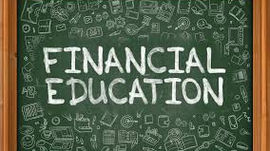Financial Education Matters…

We must start with our youth
The Importance of Financial Literacy
Financial education is vital to teach at a younger age so they have future success. Did you know a global financial literacy test finds that just 57% of adults in the U.S. are financially literate? That means 44% of individuals in the U.S. don’t really understand the basic concepts.
Youth in our society, especially teens, spent more than $270 billion in 2015. 35% of high school seniors use credit cards that increase debt for many teens before reaching college. The young people have an abundant of complex financial decisions to make that will ultimately impact their future. More-so, the youth are utilizing these funds without understanding how to manage their money wisely and create multiple streams of income.
This is where financial literacy can help!
Individuals who receive personal financial education will be able to manage their money better, but also be more knowledgeable and make smarter financial decisions. They will have fewer maxed out credit cards, have higher savings and pay any debts on time. With nearly 20% of Americans living beyond their means, education about personal finance is critical. It is also important to identify the youth’s skills early to equip with necessary steps to be successful in their future careers. By including financial literacy in children’s everyday life and understanding smart money habits early, their encourage students to own their financial future and foster smart money conversations.
Teaching financial literacy in the classroom is one great strategy to promote financial freedom. However, it is also critical for the financial literacy education to start at home! Guide them in the right direction. With the help from educators, the community, and parents, students will be off to a great start financially and headed towards financial freedom as we close generational wealth.
What can we do as a community, educators, and parents to assist with the financial education for the youth?
Be engaged with the youth by having dialogue about finances - be transparent about your financial missteps and success
Start at home - teach your children money lessons and invite them to sit with you as your work on your finances
Help your children or students identify needs versus wants
Involve children in making everyday choices such as the grocery store
Have children track their the growth of money in their bank account to learn the value of time
Always tie financial lessons to real life
Use a clear jar to help the student learn about saving
Build a business for your children or have them work on payroll on your business to learn about earning income
Stress the importance of giving back
Create a family budget and engage your children in the process of creating the budget through a fun activity
You can choose the route you want. Take control and teach our next generation to properly utilize their finances to make an impact. Teaching your children about money should be at every age and stage of their life, in some way. Taking the time now to show them the right way to handle money with be worth in the long run.











